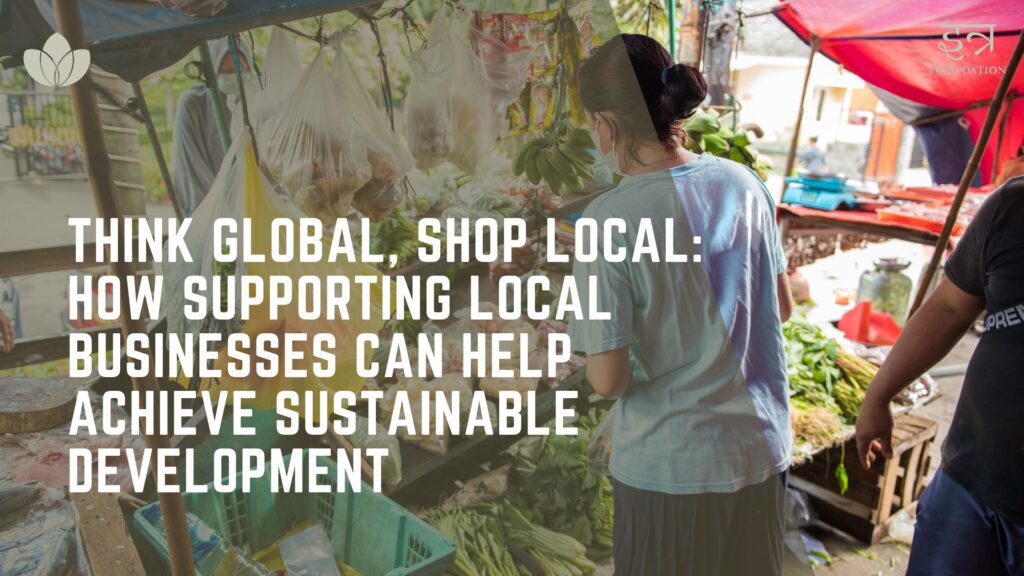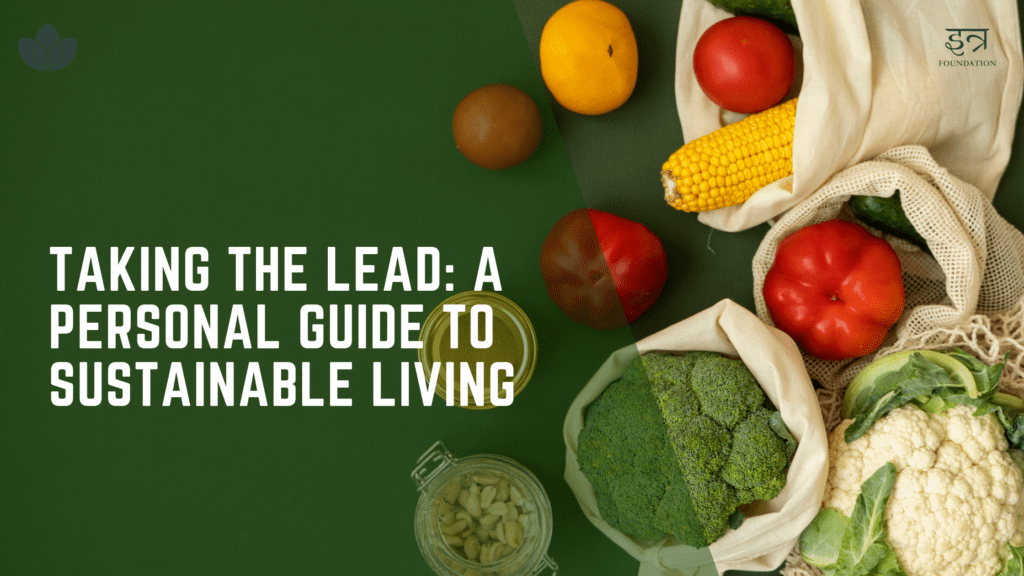When we talk about buying local, we mean purchasing goods and services from businesses that are based in our own community or region. This can include everything from produce at the farmers’ market to clothes from a local designer to services like haircuts or car repairs. But buying local isn’t just about supporting small businesses and boosting the local economy, it also plays a vital role in sustainable development.

By choosing to buy from local providers, we reduce the environmental impact of transportation, support sustainable farming and fishing practices and preserve local ecosystems. We also have a more direct impact on the economy of our own community, supporting small businesses and creating jobs. Additionally buying local enables us to build a sense of community, promote cultural heritage and traditional skills, and support inclusivity and diversity in the local market. When we buy locally, we’re not just making a purchase, we’re also making a choice to invest in our community, our environment and our future. By making conscious choices about where we spend our money, we can make a real difference in the world around us.
Environmental benefits
- As a conscious consumer, one of the major benefits one sees in buying locally is the reduced carbon footprint from transportation. When we choose to buy products that are grown or made locally, I’m cutting down on the distance that those products have to travel to get to me. This means fewer emissions from transportation and a smaller environmental impact overall.
- Another important environmental benefit of buying locally is the ability to support sustainable farming and fishing practices. By choosing to buy from local farmers, fishers and producers, We can be more certain that the products I’m purchasing have been grown or caught in an environmentally responsible way. We can also have direct communication with the producers, who can provide more transparency and accountability.
- Additionally, buying local also helps to preserve local ecosystems. When we support local businesses and farmers, We are helping to protect the land and natural resources in our own community. This can include preserving open spaces and wildlife habitats, protecting water resources and preventing pollution.

By choosing to buy locally, We are taking the step to reduce our own carbon footprint, support sustainable practices and preserve local ecosystems. It’s a small change, but it can make a big difference in creating a more sustainable future for us all.
Economic benefits
- As a consumer, when we buy locally, we are directly contributing to the stimulation of the local economy. By choosing to purchase goods and services from local businesses, we are supporting the growth and development of our own community. This can include everything from small retailers and restaurants to service providers and manufacturers.
- One of the most notable economic benefits of buying local is the support for small businesses and family-owned operations. Small businesses are the backbone of many communities and by choosing to shop local, We are supporting these businesses and helping to ensure that they can continue to thrive and grow. This can help to create a more vibrant and diverse local economy, which benefits everyone in the community.
- Another important economic benefit of buying local is the creation of jobs in the local community. When we support local businesses, We are also supporting the people who work for them. Buying local can help to create jobs for people in our own community, which can be especially beneficial in areas where unemployment is high. This can help to boost the economy and improve the overall quality of life in our community.
Social benefits
- When we choose to buy locally, We are not only supporting the local economy and environment but also building community connections. By choosing to shop at local markets, stores and restaurants, We are able to interact and connect with other members of our community. This can help to foster a sense of community and belonging, which can be especially important in areas where people may feel isolated.
- Another important social benefit of buying local is the promotion of cultural heritage and traditional skills. When we support local artisans, producers and craftsmen, We are also supporting the preservation of traditional skills and cultural heritage. This can help to keep local traditions and customs alive, which can be especially valuable in areas where cultural heritage may be at risk of being lost.

- Lastly, buying local can also encourage diversity and inclusivity in the local market. By choosing to support small businesses and local artisans, We ultimately support businesses that may be owned and operated by people from diverse backgrounds. This can help to create a more inclusive and equitable local economy, which benefits everyone in the community.
In short, buying local is not only an economic and environmental decision, but it also has social benefits. It helps to build community connections, preserve cultural heritage and traditional skills, and encourage diversity and inclusivity in the local market. It’s a way to invest in our community and contribute to a more inclusive and sustainable society.
How to buy local
As someone who wants to make a difference by buying locally, it can be a bit overwhelming to know where to start. But it doesn’t have to be difficult, there are many ways to identify local products and suppliers, and make it a part of your daily routine.
First, We can start by identifying local products and suppliers. We can look for products that are grown or made in our own region, or that carry certifications like “locally grown” or “made in (our city or state)”. We can also look for labels that indicate that products were made with sustainable or organic practices.
Another way to find local products is to visit local markets and shops. Farmer’s markets, co-ops and specialty food stores are great places to find locally-grown produce, artisanal cheeses and other specialty products. We also can look for local boutiques and craft fairs, where we can find unique handmade items that are made by local artisans.
Incorporating local products into our daily routine is also a great way to make it a habit. We can start by replacing some of the items in our grocery list with local options. For example, We can opt for a locally-made yogurt instead of a national brand or choose a locally-grown apple instead of one shipped from across the country. We also can try to eat out at locally-owned restaurants and use local services like hair salons and car repair shops.
Our Message
As a consumer, We have the power to make a difference by choosing to buy locally. We can support local farmers, artisans and businesses and be part of a more sustainable and equitable economy. We call to action for others to join us in supporting local businesses and communities. This can be as simple as seeking out locally-made products, eating at locally-owned restaurants and using local services. Every small step we take can contribute to a better future for all of us.
In short, buying local is a simple yet powerful way to make a difference in our community and contribute to a better future for all of us. As a team of ITRA Foundation an organization that strives to serve the environment, we encourage everyone to take the initiative and start supporting local businesses and communities today.





